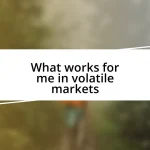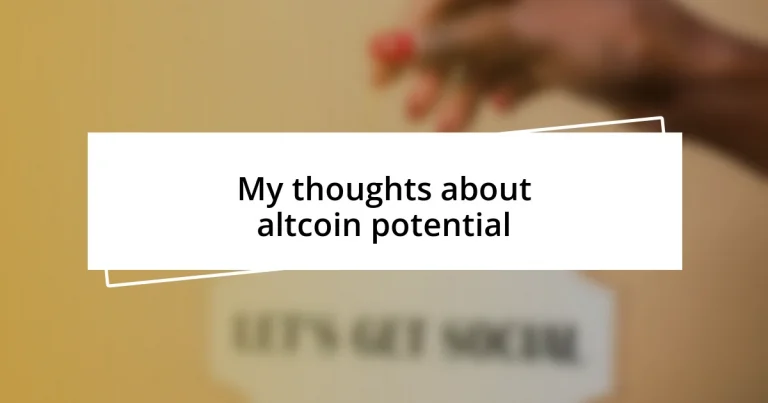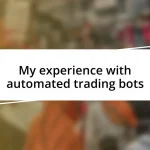Key takeaways:
- Understanding market trends, regulatory influences, and community support are crucial for altcoin investment success.
- Key metrics like market capitalization, trading volume, and technology assessment are essential for evaluating altcoin potential.
- Diversifying investments across sectors and regularly reassessing holdings can mitigate risks and capitalize on growth opportunities in the altcoin market.
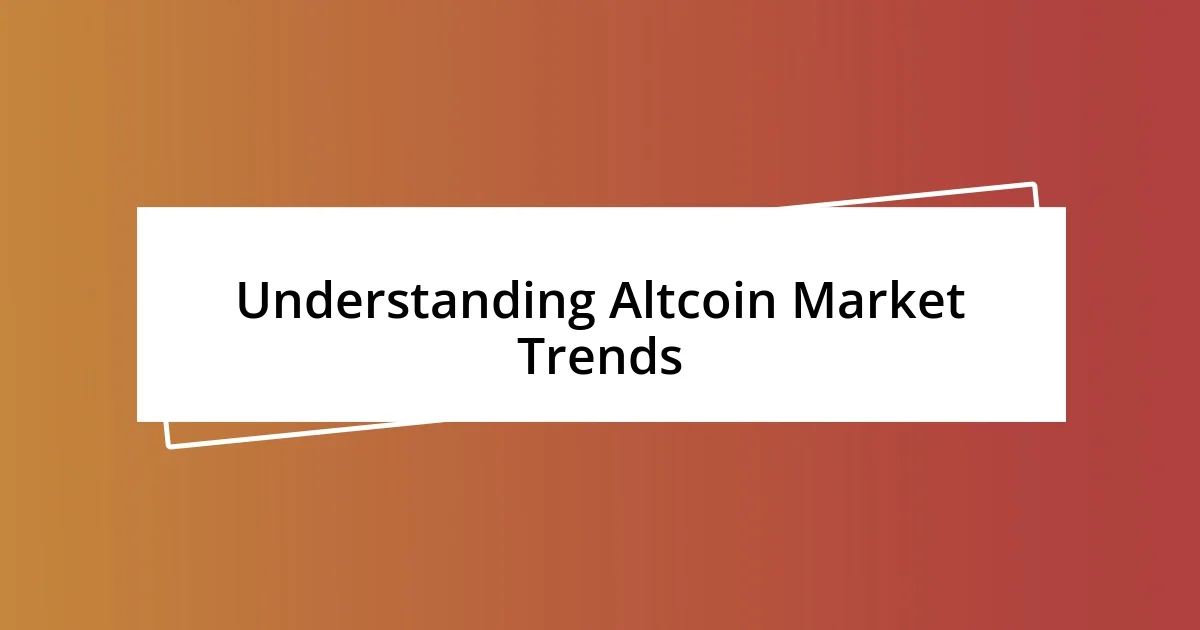
Understanding Altcoin Market Trends
When I first ventured into the world of altcoins, I was amazed by how trends often mirror broader market sentiment. For instance, during bullish phases, I observed that lesser-known coins could skyrocket seemingly overnight, fueled by social media buzz and speculative trading. Have you ever found yourself swept along by that excitement? It’s a rush, but it’s important to remember that such volatility can sometimes lead to dramatic corrections as well.
One key trend I’ve noticed is the increasing adoption of altcoins in decentralized finance (DeFi). I remember the moment I realized DeFi wasn’t just a buzzword but a game-changer. As new platforms emerge, I see more people exploring alternatives to Ethereum, which often brings attention to smaller projects with innovative use cases. How can we ignore the potential of these hidden gems when their technology could redefine finance?
Moreover, the influence of regulatory news on altcoin trends cannot be overstated. A sudden statement from a regulator can send shockwaves through the market, often changing investor sentiment overnight. I experienced this first-hand when certain coins plummeted due to unexpected regulations, making me question the stability of the market. It really drives home the importance of staying informed and being adaptable in this ever-evolving landscape.
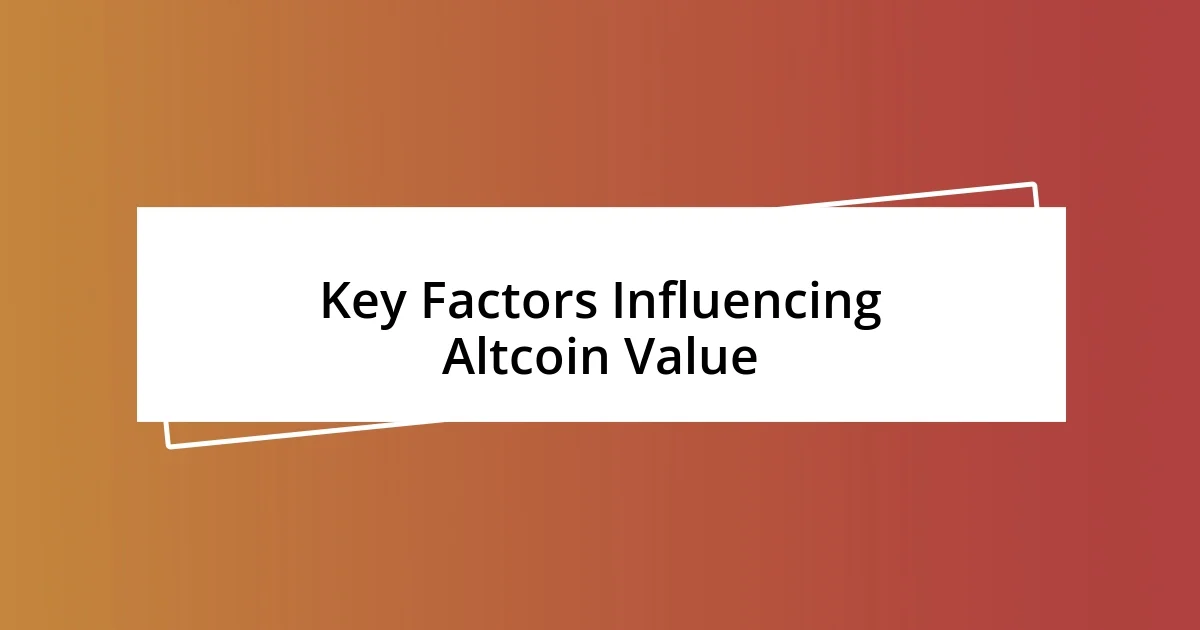
Key Factors Influencing Altcoin Value
Understanding what drives the value of altcoins is crucial for anyone serious about investing in them. In my experience, solid project fundamentals play a significant role. I remember investing in an altcoin that initially flourished, driven by a strong community and an innovative roadmap. But once the hype died down and the project failed to deliver on its promises, I saw the value drop dramatically. This taught me that community support and project execution are vital for long-term success.
Key factors influencing altcoin value include:
- Technology and Innovation: The technological foundation and unique features of an altcoin can significantly impact its adoption and value.
- Market Sentiment: Public perception can shift quickly, often shaped by news or social media dynamics, leading to fluctuations.
- Regulatory Environment: Government regulations can have immediate effects on the worth of altcoins, as seen during sudden policy announcements.
- Liquidity: The ease with which an altcoin can be bought or sold in the market affects its price stability.
- Community Support: A strong, engaged community can elevate a coin’s visibility and utility, which often translates to value growth.
Recognizing these factors can enhance one’s strategy and understanding in the diverse landscape of altcoins. I’ve learned to keep a close eye on these elements, knowing they can make or break an investment.
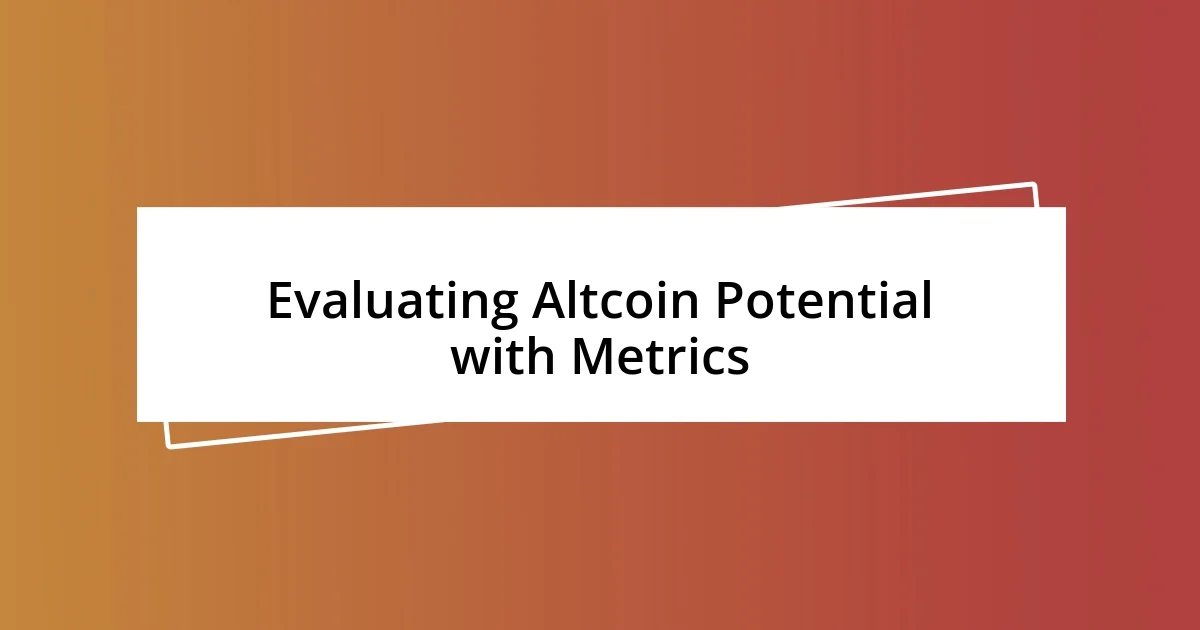
Evaluating Altcoin Potential with Metrics
When evaluating the potential of altcoins, metrics play an indispensable role. One measure I often find myself diving into is market capitalization, which can signify the scale and reach of an altcoin. For example, I recall analyzing a lesser-known coin with a surprisingly low market cap that later exploded in value. It’s amazing how a deeper dive into such numbers can reveal hidden opportunities.
Another critical metric is trading volume, which reflects the activity and liquidity of an altcoin. I remember a time when I overlooked a coin with declining trading volume, assuming it was losing interest, only to later find out that it was part of a larger strategic partnership that revitalized its community. Hasn’t it happened to you too — missing the bigger picture because of a narrow focus? It’s important to consider all metrics collectively when making investment decisions.
Lastly, I find the technology behind the altcoin immensely relevant. Metrics like transaction speed and scalability can determine long-term viability. Reflecting on my early days, I got caught up in the hype of a project promising explosive growth. It wasn’t until I examined its underlying tech that I recognised potential flaws that could hinder its success. I’ve learned that a coin’s innovation can often set it apart from others, making thorough metric evaluation an absolute necessity.
| Metric | Importance |
|---|---|
| Market Capitalization | Indicates the overall value and scale of the altcoin. |
| Trading Volume | Reflects the activity level and liquidity, which affect price stability. |
| Transaction Speed | Affects efficiency and user adoption, crucial for long-term success. |
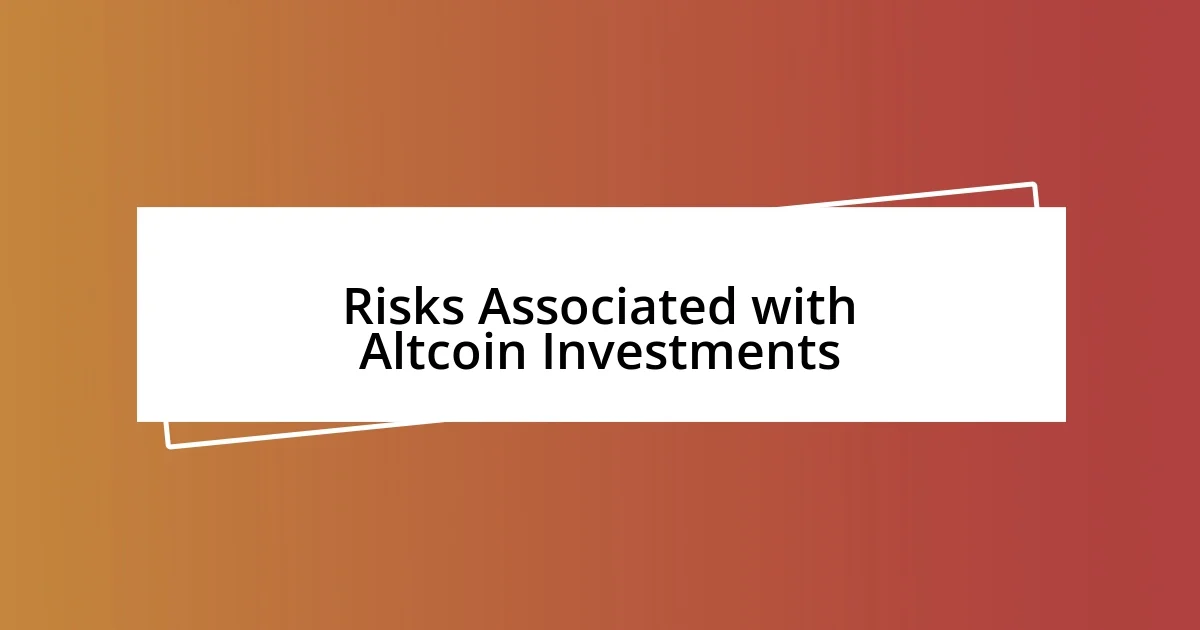
Risks Associated with Altcoin Investments
Investing in altcoins isn’t just exciting; it comes with its fair share of risks that I’ve personally encountered. One particular instance comes to mind when I jumped into a new altcoin that promised to revolutionize a specific industry. I remember the thrill of the investment, but as the weeks passed, the project lost its momentum, and the price plummeted. This experience taught me that volatility is a constant companion in altcoin investments, so I now make it a priority to prepare for potential dips.
Another risk that I can’t overlook is the potential for scams or poorly managed projects. There was a time when I saw a flashy marketing campaign for an altcoin that turned out to be a pump-and-dump scheme. I was shocked to learn that many investors like myself were left holding worthless tokens as a result. It made me realize that doing thorough research and keeping an eye out for red flags—like lack of transparency or a vague roadmap—could spare me a lot of heartache down the line. Have you ever felt that pang of regret from skipping due diligence? It’s a feeling I wouldn’t wish on anyone.
Additionally, the regulatory landscape is ever-changing, which adds another layer of uncertainty. I found myself in a tight spot with an altcoin that thrived until a sudden regulatory change led to a dramatic price drop. It was an eye-opener for me, highlighting how external factors beyond my control can drastically impact my investments. These experiences have instilled in me a cautionary approach to altcoin investing—one where I always assess not only the coin itself but also the environment in which it operates.
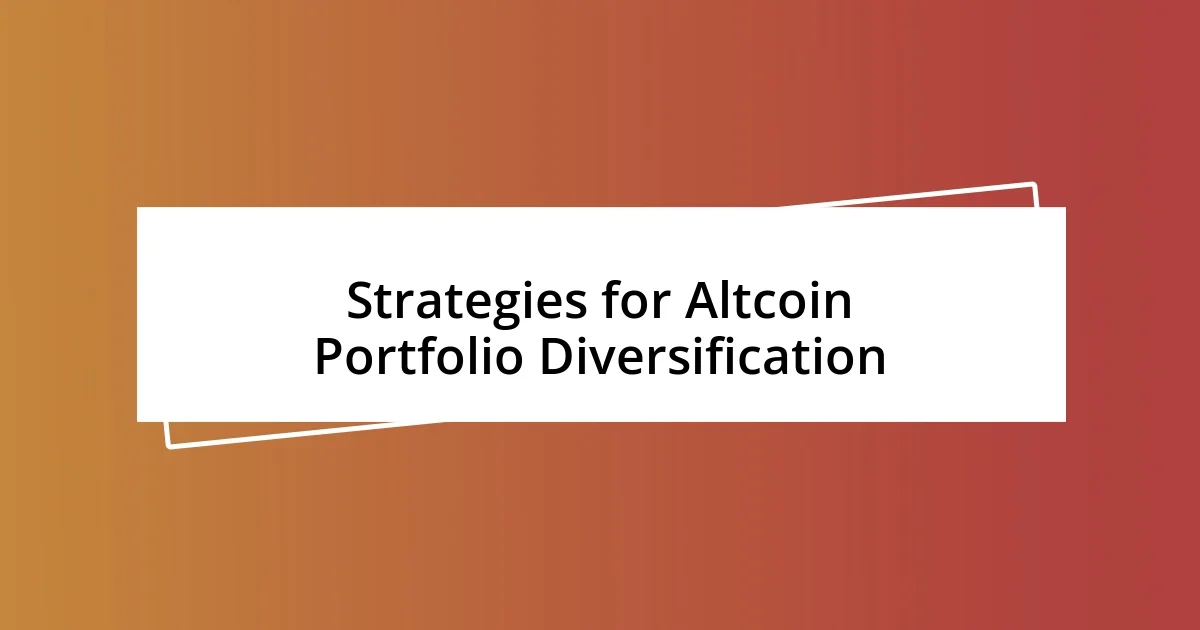
Strategies for Altcoin Portfolio Diversification
Diversifying my altcoin portfolio feels like building a robust safety net around my investments. One strategy I’ve found particularly useful is spreading my investments across different sectors within the altcoin space, such as DeFi, NFTs, and gaming projects. Doing this allows me to minimize risks, as various sectors can perform differently under market conditions. Have you ever noticed how some coins thrive while others falter? It’s all about balance.
When I first started, I put too much into a single altcoin that seemed promising. I learned the hard way that having an over-concentration can be risky when the market goes south. Now, I prefer a more strategic approach by designating specific percentages of my portfolio to various altcoins based on their perceived risk and potential for growth. For example, I might allocate 50% to established projects, while the remaining 50% can be divided between new and speculative coins. This way, I keep my investment grounded while still having the potential to capture substantial gains from newer ventures.
Another key aspect of my diversification strategy is regularly reassessing my holdings. I often set aside time each month to evaluate the performance of my altcoins against the market landscape. Recently, I sold a small portion of a coin that had performed well but wasn’t showing much promise for future growth. Instead, I reinvested those funds into a new project with innovative technology. This constant vigilance helps me stay ahead of trends and adjust my portfolio proactively. Have you considered how often you assess your investments? Small adjustments can lead to significant benefits in the long run.
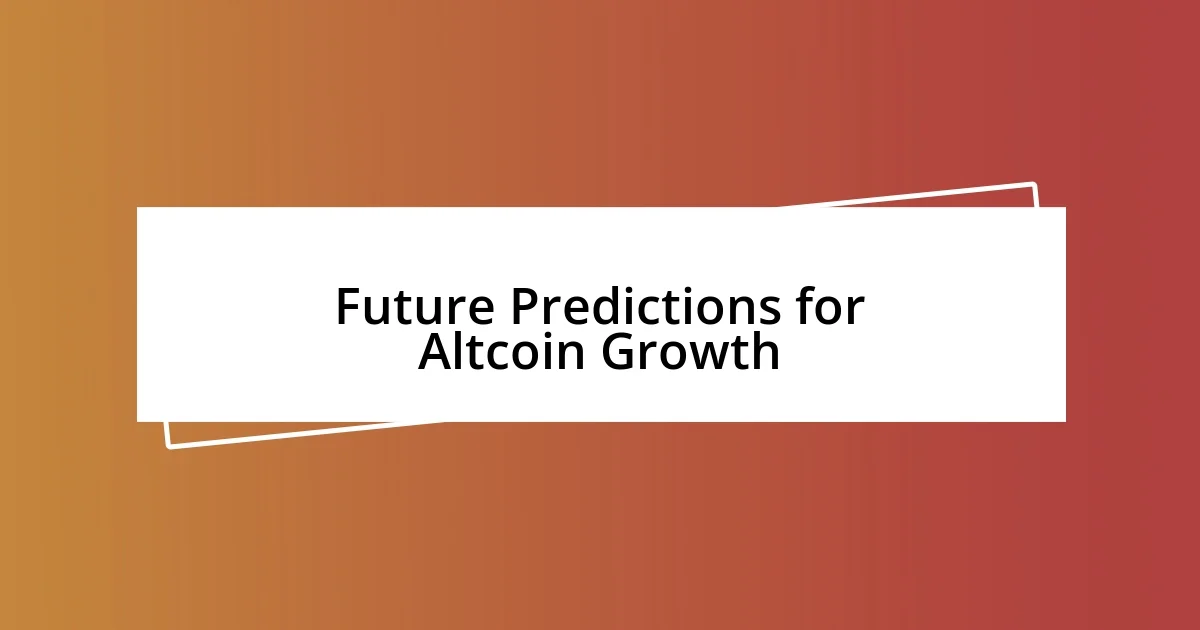
Future Predictions for Altcoin Growth
It’s hard not to feel excited about the future of altcoins, especially given the innovation constantly bubbling beneath the surface. I remember when I first invested in a mid-tier altcoin that was developing a unique solution for supply chain transparency. Initially, the price soared, and I felt that rush of potential all over again. Predicting their growth, I believe that as more people recognize the real-world applications of these coins, we may see widespread adoption, driving prices higher. Have you thought about how mainstream acceptance could finally shape the altcoin landscape?
Moreover, I’m intrigued by the rise of environmentally conscious altcoins. I can’t help but think about the impact of sustainability on future investments. For instance, I recently stumbled upon an altcoin committed to carbon neutrality. By aligning with ethical values, I suspect these coins will attract not just niche investors but also those looking to make socially responsible choices. The blend of finance and sustainability could propel certain altcoins into the spotlight in ways we’ve never seen before.
Lastly, the influence of technological advancements can’t be understated. When a new blockchain upgrade or protocol is announced, I often find myself re-evaluating my portfolio. A few months ago, I sold off some coins that weren’t adapting to changes in technology. It’s evident that altcoins that are continually evolving and integrating cutting-edge technology have a greater chance of thriving, don’t you think? Watching the trends unfold has taught me that the most adaptable coins are often the ones that realize their potential.











